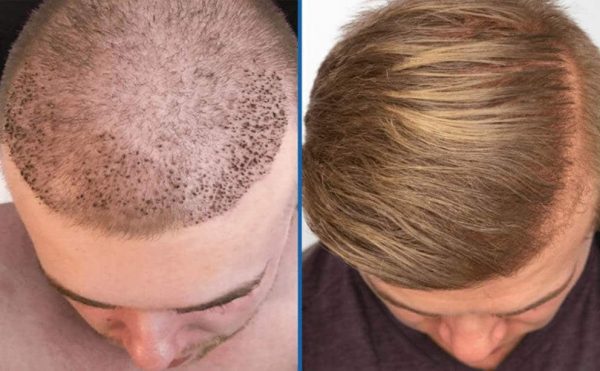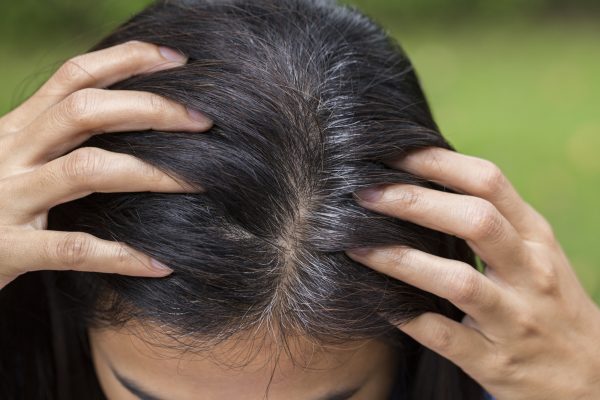Could your contraception be the source of your constant shedding? Obstetricians talk about the connection between birth control and hair loss – and what you can do about it.
When you’re ready to ditch your current form of contraception, you’ve undoubtedly been warned to expect an uncomfortable, undesirable side effect or two.
Your roommate may have told you that copper IUDs can cause unpleasant menstrual cramps or that the pill might cause nausea and headaches during the first few menstrual cycles.
Is your birth control, however, also capable of causing hair loss?
Ob-gyns explain the connection between birth control and hair loss, including which contraceptives may cause this side effect and what to do if you suspect you’re experiencing it.
Is it possible for birth control to cause hair loss?
Hair thinning or shedding, like any other adverse effect of medicine, is just a possibility while using a contraceptive. According to Sophia Yen, M.D., M.P.H., co-founder and CEO of Pandia Health, a birth control delivery firm, hormonal birth control can cause hair loss.
She notes that one contributing element is the kind of progestin used in specific birth control. According to the National Library of Medicine, progestin is a kind of the hormone progesterone that, when used in birth control, suppresses ovulation and modifies cervical mucus and the uterine lining to prevent conception (NLM).
There are eight different kinds of progestins. According to a study published in the Journal of the American Academy of Physician Assistants, some progestins can have comparable effects as androgens — a hormone that shortens the anagen phase of the hair development cycle (when hair is actively developing).
According to the JAAPA article, a progestin with a higher androgenic impact might produce an increase in dihydrotestosterone (DHT), a hormone that disrupts the hair development cycle and reduces scalp follicles, resulting in progressive hair loss – a disease known as androgenic alopecia.
Simply put, “certain progestins are more androgenic than others, and it appears that the more androgen impact it has, the more probable it is to induce hair loss,” explains Dr. Yen.
Furthermore, hormonal contraceptives containing these androgenic progestins might exacerbate hair loss in women who already have androgenic alopecia, which is thought to be caused by genetic differences.
According to the JAAPA article, these androgenic progestins can also cause chronic telogen effluvium, or excessive shedding caused by the hair follicle prematurely entering the telogen phase (the resting period of hair development).
According to the same study, this shedding can progress to androgenic alopecia in people with a family history of the illness.
Birth Control Pills That Could Cause Hair Loss
Contraceptives containing the progestins norethindrone, norgestrel, or levonorgestrel have the highest androgenic effects and the greatest propensity to cause hair loss, according to a study. However, research into the prevalence of this side effect is lacking.
In one study of over 17,000 women in Finland who had an IUD containing the progestin levonorgestrel (which has high androgenic effects and is also found in some progestin-only and combined oral contraceptives), nearly 16% reported hair loss while using the medication; however, the exact cause of this hair loss was not investigated, so the link cannot be verified.
Similarly, a review of case studies discovered that women who experienced hair loss following the insertion of a levonorgestrel IUD also reported having no risk factors for alopecia and that some users’ hair loss recovered when the IUD was removed, implying a link between birth control and hair loss.
To be clear, the issue is not limited to IUDs: 2001 research on the adverse effects of Norplant, a contraceptive arm implant containing levonorgestrel, found a “statistically significant” higher incidence of baldness among implant users as compared to those who used an IUD or underwent sterilization (closing off the fallopian tubes).
According to the JAAPA study, the risk of hair loss with oral contraceptives may vary depending on the kind of pill and the components in it.
Progestin-only pills (and other progestin-only contraceptives) may increase the risk of androgenic alopecia because they lack estrogen, which has been shown in studies to counteract the androgenic effects of progestin by increasing levels of sex hormone-binding globulin (SHBG) — a protein made by the liver that binds to and inhibits follicle-shrinking DHT.
According to the JAAPA research, this increase in SHBG appears to be strongest with combined contraceptive pills containing 30 micrograms of Ethinyl estradiol (for reference, most combination pills contain 10 to 35 micrograms of this synthetic estrogen, according to the Mayo Clinic) and progestins that already have a lower androgenic effect (e.g. desogestrel, norgestimate, norelgestromin, and etonoges
What Should You Do If You Believe Your Birth Control Is Causing Hair Loss?
Before you stress about all the loose strands in your brush, remember that it’s typical to lose 50 to 150 hairs every day, whether you take birth control or not, according to Dr. Yen. If you believe you are losing more than that, consult your doctor.
According to Dj Singh, M.D., M.M.M., F.A.C.O.G., an ob-gyn in Torrance, California, if you see substantial shedding, contact your primary physician, who may assist identify any underlying issues that may be contributing to your hair loss.
“Stress, heredity, stress, childbirth, extreme dieting, any viral infections — including, in this pandemic era, COVID — can all lead to hair loss,” she says.
“Depending on the underlying medical problem, it may require a team of specialists, including endocrinologists, ob-gyns, dermatologists, and/or rheumatologists, in addition to your general physician, to discover the proper treatment.”
If your doctor feels your new birth control is causing hair loss, Dr. Yen recommends remaining with your contraceptive technique for three to six months so your body can adjust to the new hormones – as long as you obtain permission from your own doctor to do so.
“If it isn’t improved by then, your body doesn’t like it, and you should think about changing [methods],” she says. Refresher: According to the JAAPA article, there are eight distinct kinds of progestins, and switching to one with a lower androgenic impact may help with shedding.
Similarly, the JAAPA study found that using a combination birth control tablet containing at least 30 mcg of ethinyl estradiol helped minimize hair loss.
Of course, hormonal contraception isn’t your only choice.
Condoms, the copper IUD, or Phexxi (a vaginal gel that maintains vaginal pH after sex to limit sperm motility) are all hormone-free choices that can minimize your chance of conception without raising your risk of hair loss.
According to the JAAPA article, if you’re still experiencing hair loss six months after switching to non-hormonal birth control or one with a lower androgenic impact, consult with your dermatologist to establish the best strategy to manage your shedding.
The Bottom Line on Birth Control and Hair Loss
According to a recent analysis published in the journal Dermatology, while many contraceptives do include androgenic progestins that may cause hair loss, there isn’t enough high-quality data to show a causal association between the two.
Still, if you’re concerned that a birth control you’re thinking about using may cause you to lose all your hair — or that your current contraception is causing you to lose a lot of hair – talk to your doctor about it. Remember that you have choices.


